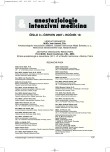-
Medical journals
- Career
Impact of addition of synbiotics (Synbiotic 2000 Forte) to enteral nutrition on the course of MODS, occurrence of sepsis, immune status and gut function in long-term critically ill patients
Authors: V. Šrámek 1; L. Dadák 1; M. Štouračová 2; P. Štětka 1; M. Kýr 3; A. Tichá 4; R. Hyšpler 4; P. Kuklínek 2
Authors‘ workplace: Anesteziologicko-resuscitační klinika, Fakultní nemocnice u svaté Anny v Brně 1; Ústav imunologie a alergologie, Fakultní nemocnice u svaté Anny v Brně 2; Institut biostatistiky a analýz, MU v Brně 3; Gerontologická a metabolická klinika, Fakultní nemocnice Hradec Králové 4
Published in: Anest. intenziv. Med., 18, 2007, č. 3, s. 157-163
Category: Intensive Care Medicine - Original Paper
Overview
Objective:
To investigate if the addition of synbiotics to enteral nutrition improves the prognosis, morbidity, immune status, enteral nutrition tolerance and gut integrity in the critically ill patient.Design:
Prospective, open, placebo controlled clinical study.Setting:
Department Anaesthesia and Intensive Care, St. Anna University Hospital, Brno, Czech Republic.Material and methods:
Patients estimated to stay in the ICU > 7 days were randomised to either post-pyloric Synbiotic Forte (Medipharm, Sweden) or tea. The ICU mortality, ICU length of stay, nosocomial infections, occurrence of sepsis, antibiotic usage and MODS course (SOFA score) were evaluated. The immune status [CD14+HLADr+,TNF-alfa production of the whole blood after LPS stimulation (TNF-alfa) and plasma IL-6 concentrations] was monitored on day 1 (D1), day 5 (D5), day 8 (D8) and then once a week.The amount of enteral nutrition and number of stools were monitored daily. On D1, D5 and D8 a gut permeability test (lactulosa/mannitol) was performed.Results:
Twenty six patients were enrolled in the study (M/F 18/8; mean age 55 (37; 63) years). APACHE II on admission was 24 (21; 27). Synbiotic was given to 15 and placebo to 11 patients. There was no difference in ICU mortality (p = 0.73) and ICU length of stay – Synbiotic 14 days (6; 28) and placebo 10 days (7; 20); p = 0.80. No difference was found in the number of nosocomial infections – Synbiotic 9/15 and placebo 4/10 patients (p = 0.43). The SOFA score course in the first 8 days also did not differ. In both groups the SOFA score decreased significantly – Synbiotic p = 0.074 and placebo p = 0.026.The severity of sepsis tended to decrease in the Synbiotic group (p = 0.096). In the first 5 days the CRP course and the immune parameters did not differ between the groups (p > 0.10) except for the white cell count which increased in the placebo group (p = 0.02). There was no difference between the groups in the amount of enteral nutrition (p = 0.92) or diarrhoea occurrence (p = 0.78). The gut permeability was pathological in both groups (lactulosa/mannitol > 0.1) and did not change in the first 5 days. A significant decrease of lactulosa/mannitol was observed in the Synbiotic group on D8 (p = 0.02).Conclusion:
Addition of Synbiotic Forte to the enteral nutrition of the critically ill does not change their prognosis, immune status or enteral nutrition tolerance. Synbiotic Forte can alleviate the course of infections and improve gut integrity.Key words:
intensive care – outcome – enteral nutrition – synbiotic – immunocompetence – MODS – nosocomial infections
Labels
Anaesthesiology, Resuscitation and Inten Intensive Care Medicine
Article was published inAnaesthesiology and Intensive Care Medicine

2007 Issue 3-
All articles in this issue
- Altering the hemodynamics during abdominal aortic aneurysm repair by acute normovolemic hemodilution
- Early resuscitation of septic shock to different levels of arterial blood pressure
- Impact of addition of synbiotics (Synbiotic 2000 Forte) to enteral nutrition on the course of MODS, occurrence of sepsis, immune status and gut function in long-term critically ill patients
- Extended immunologic profile taken during the first days in the ICU and the prognosis of patients requiring long-term intensive care
- Monocyte activation during the first days in the ICU and survival in a heterogeneous group of patients requiring long-term intensive care
- Helium and its role in current medicine
- The evolution of airway management
- Anaesthesiology and Intensive Care Medicine
- Journal archive
- Current issue
- Online only
- About the journal
Most read in this issue- Helium and its role in current medicine
- The evolution of airway management
- Altering the hemodynamics during abdominal aortic aneurysm repair by acute normovolemic hemodilution
- Impact of addition of synbiotics (Synbiotic 2000 Forte) to enteral nutrition on the course of MODS, occurrence of sepsis, immune status and gut function in long-term critically ill patients
Login#ADS_BOTTOM_SCRIPTS#Forgotten passwordEnter the email address that you registered with. We will send you instructions on how to set a new password.
- Career

